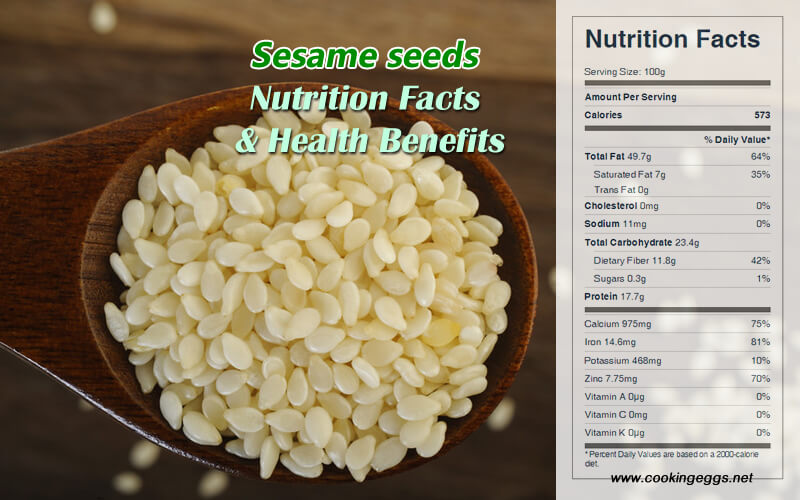Sesame seeds Nutrition Facts & Health Benefits
Sesame, also called benne, is a member of the sesame family. It has high resistance to oxidation and rancidity. Here are the nutritional benefits of sesame seeds.
Sesame seeds contain approximately 50 percent oil and 25 to 35 percent protein.They are high in iron, magnesium, manganese, and copper. They also contain vitamin E, calcium, zinc, and sesamin, a lignin that is a powerful antioxidant and can inhibit cholesterol production.
Sesame seeds are available either hulled or unhulled. The hulls contain a significant amount of calcium. With the loss of their hull, sesame seeds also lose much of their fiber, calcium, potassium, vitamin B6 and iron.

The nutritional value of sesame seeds
In a 100 g amount, dried whole sesame seeds provide 573 calories and are composed of 5% water, 23% carbohydrates (including 12% dietary fiber), 50% fat, and 18% protein.
One ounce of toasted sesame seed kernels provides 161 calories, 7.4 g carbohydrate, 4.8 g protein, 13.6 g fat, 4.8 g dietary fiber, 19 IU vitamin A, 27 mcg folic acid, 115 mg potassium, 11 mg sodium, 219 mg phosphorus, 37 mg calcium, 98 mg magnesium, 2.21 mg iron, and 2.9 mg zinc.
Sesame seeds Nutrition Facts Label
Health Benefits of Sesame seeds
Sesame seed is known as the "Queen of Oilseeds" because it has high resistance to oxidation and rancidity. It’s the main ingredient in hummus, but it can also be used in baking and even ice cream!
Sesame seeds are the vegetarian’s friend. A large handful will supply about 26 grams of protein, or about two-thirds of a day’s needs for a reasonably active man. Unusually for vegetable sources, they are also rich in the amino acids methionine and tryptophan, which are important for good liver and kidney health.
Sesame seeds are also well endowed with minerals, containing over 14 mg of iron and 7 mg of zinc per 100 g. Eat a vitamin-C-rich fruit or vegetable at the same meal, though, to help your body absorb the minerals. Sesame seeds are also a good source of polyunsaturated fatty acids and vitamin E.
Sesame seeds contain the highest phytosterol content among plant-based foods. Phytosterols are essentially known as plant-based cholesterol-lowering foods. They also contain vital minerals, vitamins, phytosterols, polyunsaturated fatty acids, and tocopherols. The lignans, coupled with tocopherols and phytosterols, provide defense mechanisms against reactive oxygen species and increase the quality of the oil by preventing oxidative rancidity.
Sesame seeds have been shown to help with symptoms of arthritis because of their potent anti-inflammatory activity. From an anti-inflammatory standpoint, sesamin has been shown to inhibit the release of pro-inflammatory cytokines. A study that consisted of fifty participants assessed the effect of sesame on arthritis symptoms. After giving the participants 40 grams of sesame seeds daily for two months, they found a significant reduction in CRP and IL-6.
Sesame seeds are rich in polyunsaturated fatty acids and are an excellent source of fiber and protein. Two substances unique to sesame seeds are sesamin and sesamolin. Both of these substances belong to a special class of beneficial fibers called lignans, which have been shown to have a cholesterol-lowering effect in humans and to prevent high blood pressure and increase vitamin E supplies in animals. Sesamin has also been found to protect the liver from oxidative damage.
They have been found to lower cholesterol, prevent high blood pressure, and also possess both anti-inflammatory and immunomodulatory activities. These substances are also the antioxidative agents that give sesame oil its long shelf life and make it very stable.
Health Risk
The hulls of sesame seeds contain oxalates, which can cause problems for those with kidney disease, gout, vulvar pain, rheumatoid arthritis, or other conditions that may require a low-oxalate diet.
Oxalic acid can inhibit the body's absorption of iron and calcium and should be consumed only in moderation. Hulled sesame seeds may be chemically treated, so it's best to soak them overnight and rinse them in the morning to remove any chemical residue.
As many seeds do, whole sesame seeds contain a significant amount of phytic acid, which is considered an antinutrient in that it binds to certain nutritional elements consumed at the same time, especially minerals, and prevents their absorption by carrying them along as they pass through the small intestine. Heating and cooking reduce the amount of acid in the seeds.
Sesame can trigger the same allergic reactions, including anaphylaxis, as seen with other food allergens. A cross-reactivity exists between sesame and peanuts, hazelnuts, and almonds. In addition to food products derived from sesame seeds, such as tahini and sesame oil, people with sesame allergies are encouraged to be aware of foods that may contain sesame, such as baked goods. In addition to food sources, individuals allergic to sesame have been warned that a variety of non-food sources may also trigger a reaction to sesame, including cosmetics and skin-care products.